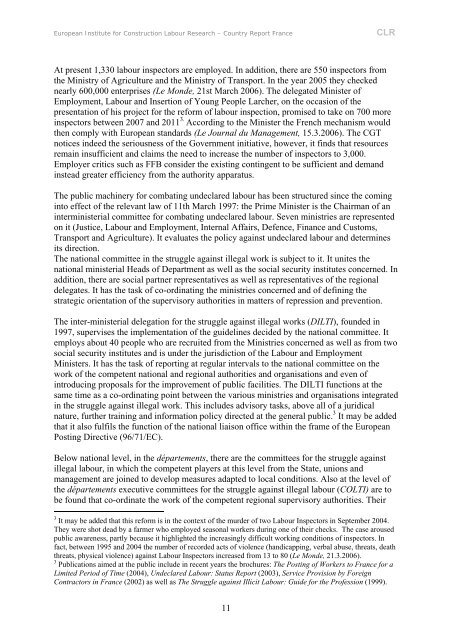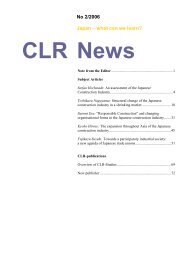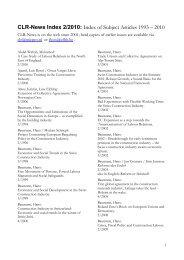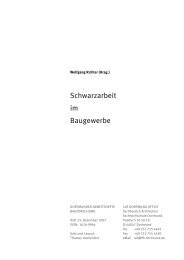Country report France - Construction Labour Research
Country report France - Construction Labour Research
Country report France - Construction Labour Research
You also want an ePaper? Increase the reach of your titles
YUMPU automatically turns print PDFs into web optimized ePapers that Google loves.
European Institute for <strong>Construction</strong> <strong>Labour</strong> <strong>Research</strong> – <strong>Country</strong> Report <strong>France</strong>CLRAt present 1,330 labour inspectors are employed. In addition, there are 550 inspectors fromthe Ministry of Agriculture and the Ministry of Transport. In the year 2005 they checkednearly 600,000 enterprises (Le Monde, 21st March 2006). The delegated Minister ofEmployment, <strong>Labour</strong> and Insertion of Young People Larcher, on the occasion of thepresentation of his project for the reform of labour inspection, promised to take on 700 moreinspectors between 2007 and 2011 3. According to the Minister the French mechanism wouldthen comply with European standards (Le Journal du Management, 15.3.2006). The CGTnotices indeed the seriousness of the Government initiative, however, it finds that resourcesremain insufficient and claims the need to increase the number of inspectors to 3,000.Employer critics such as FFB consider the existing contingent to be sufficient and demandinstead greater efficiency from the authority apparatus.The public machinery for combating undeclared labour has been structured since the cominginto effect of the relevant law of 11th March 1997: the Prime Minister is the Chairman of aninterministerial committee for combating undeclared labour. Seven ministries are representedon it (Justice, <strong>Labour</strong> and Employment, Internal Affairs, Defence, Finance and Customs,Transport and Agriculture). It evaluates the policy against undeclared labour and determinesits direction.The national committee in the struggle against illegal work is subject to it. It unites thenational ministerial Heads of Department as well as the social security institutes concerned. Inaddition, there are social partner representatives as well as representatives of the regionaldelegates. It has the task of co-ordinating the ministries concerned and of defining thestrategic orientation of the supervisory authorities in matters of repression and prevention.The inter-ministerial delegation for the struggle against illegal works (DILTI), founded in1997, supervises the implementation of the guidelines decided by the national committee. Itemploys about 40 people who are recruited from the Ministries concerned as well as from twosocial security institutes and is under the jurisdiction of the <strong>Labour</strong> and EmploymentMinisters. It has the task of <strong>report</strong>ing at regular intervals to the national committee on thework of the competent national and regional authorities and organisations and even ofintroducing proposals for the improvement of public facilities. The DILTI functions at thesame time as a co-ordinating point between the various ministries and organisations integratedin the struggle against illegal work. This includes advisory tasks, above all of a juridicalnature, further training and information policy directed at the general public. 3 It may be addedthat it also fulfils the function of the national liaison office within the frame of the EuropeanPosting Directive (96/71/EC).Below national level, in the départements, there are the committees for the struggle againstillegal labour, in which the competent players at this level from the State, unions andmanagement are joined to develop measures adapted to local conditions. Also at the level ofthe départements executive committees for the struggle against illegal labour (COLTI) are tobe found that co-ordinate the work of the competent regional supervisory authorities. Their3 It may be added that this reform is in the context of the murder of two <strong>Labour</strong> Inspectors in September 2004.They were shot dead by a farmer who employed seasonal workers during one of their checks. The case arousedpublic awareness, partly because it highlighted the increasingly difficult working conditions of inspectors. Infact, between 1995 and 2004 the number of recorded acts of violence (handicapping, verbal abuse, threats, deaththreats, physical violence) against <strong>Labour</strong> Inspectors increased from 13 to 80 (Le Monde, 21.3.2006).3 Publications aimed at the public include in recent years the brochures: The Posting of Workers to <strong>France</strong> for aLimited Period of Time (2004), Undeclared <strong>Labour</strong>: Status Report (2003), Service Provision by ForeignContractors in <strong>France</strong> (2002) as well as The Struggle against Illicit <strong>Labour</strong>: Guide for the Profession (1999).11









